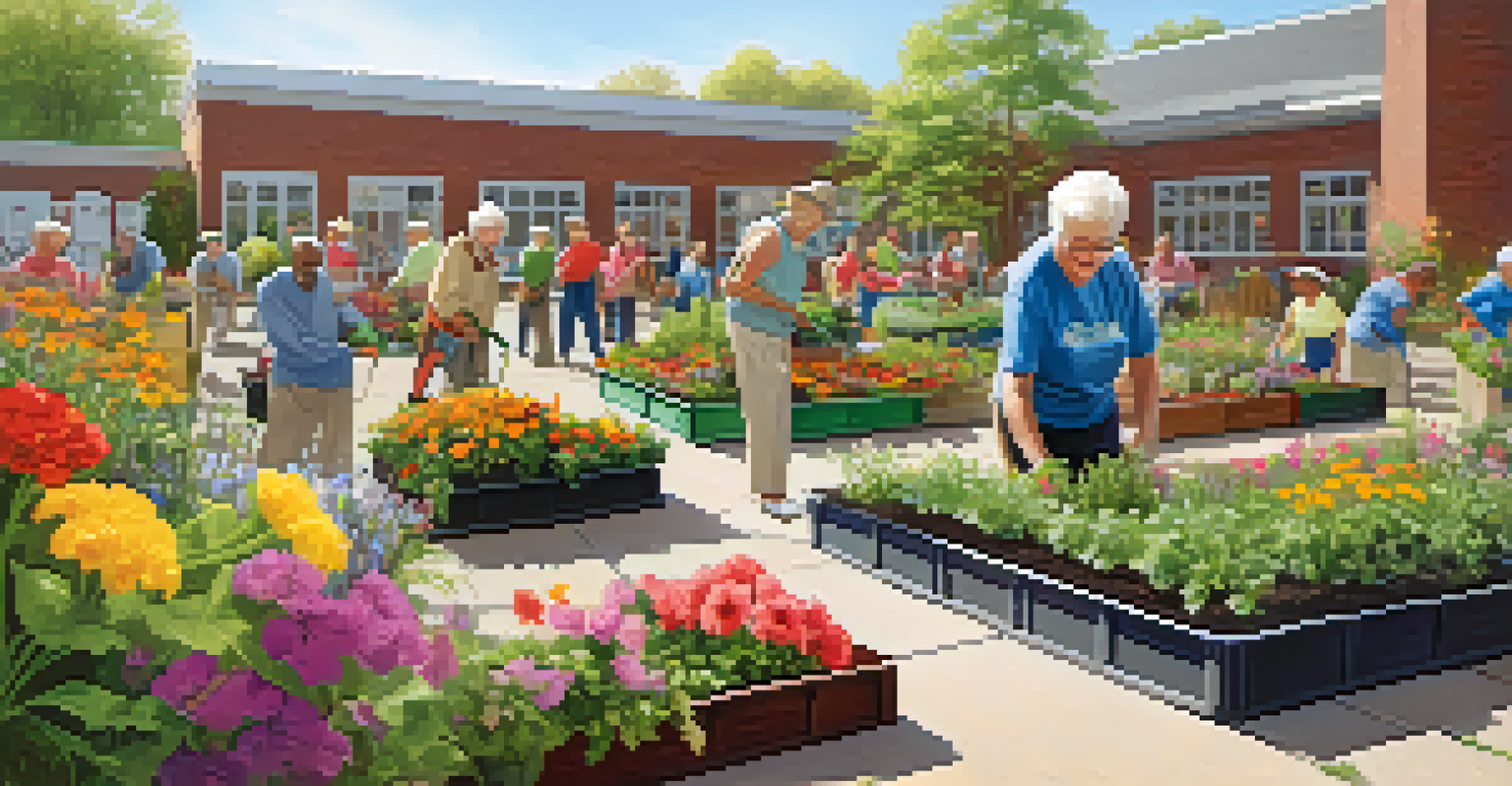Healthy Aging: The Power of a Positive Social Network

The Importance of Social Connections in Aging
As we age, the relationships we foster play a crucial role in our overall well-being. Having a strong social network can lead to improved mental health, which is vital for healthy aging. Studies show that individuals with active social circles tend to experience lower levels of depression and anxiety.
The greatest gift of life is friendship, and I have received it.
Interactions with friends, family, and community members provide emotional support that can help us navigate life's challenges. This support can be particularly essential during transitions such as retirement or the loss of a loved one. Engaging with others gives us a sense of belonging, making the journey of aging much more enjoyable.
Moreover, the act of simply being social can contribute to cognitive health. Activities like conversations, group outings, or even participating in clubs stimulate our minds, which is essential for maintaining cognitive function as we age.
The Science Behind Social Networks and Longevity
Research has consistently shown that strong social ties contribute to longevity. In fact, a study published in the journal 'PLOS Medicine' found that individuals with robust social networks had a 50% greater likelihood of survival over a given period compared to those with weaker connections. This statistic highlights the undeniable link between social interaction and health.

The reasons behind this connection are multi-faceted. Socializing can reduce stress, which is known to negatively impact health. Positive relationships also encourage healthy behaviors, such as regular exercise and better nutrition, as friends often motivate each other to stay active and eat well.
Social Connections Boost Well-Being
Strong social networks significantly enhance mental health and overall well-being as we age.
Thus, investing in our social networks isn't just about having fun; it can significantly influence our overall health and longevity. By prioritizing relationships, we are effectively investing in our future well-being.
Building a Positive Social Network
Creating a supportive social network starts with assessing our current relationships. Are they uplifting, or do they drain your energy? Surrounding ourselves with positive influences can propel us toward healthier lifestyles and greater happiness as we age.
In the end, it’s not the years in your life that count. It’s the life in your years.
Consider joining community groups, clubs, or classes that align with your interests. Whether it’s a gardening club, a book group, or a fitness class, these activities provide excellent opportunities to meet like-minded individuals. Shared interests can spark meaningful connections and friendships.
Additionally, don’t hesitate to reach out to old friends or acquaintances. Sometimes, rekindling past relationships can be just as fulfilling as making new ones. A simple phone call or coffee date can reignite that bond and offer the emotional support we all need.
Overcoming Barriers to Social Interaction
As we age, various barriers can hinder our social interactions, such as mobility issues, health concerns, or even feelings of loneliness. Recognizing these barriers is the first step toward addressing them. It’s important to acknowledge that many people face similar challenges and that solutions are available.
One effective way to combat these barriers is through technology. Virtual meet-ups, video calls, and social media can help maintain connections with friends and family, regardless of distance. Embracing technology can create opportunities for socializing without the constraints of physical limitations.
Volunteering Fosters Community Bonds
Engaging in volunteer work not only helps others but also connects you with like-minded individuals, enriching your social life.
Moreover, local organizations often provide resources and activities specifically designed for seniors. These can include transportation services or social events that cater to older adults, making it easier to engage with others and build a supportive network.
The Role of Volunteering in Social Engagement
Volunteering is a powerful way to enhance your social network while making a difference in your community. Engaging in volunteer work not only helps others but can also provide a sense of purpose and fulfillment. This sense of belonging can be incredibly beneficial for mental health as we age.
By volunteering, you meet new people who share your values and passions, which can lead to long-lasting friendships. Whether it’s helping at a local food bank or tutoring children, the opportunities to connect with others are endless. This shared mission can create strong bonds among volunteers.
Additionally, volunteering can keep you physically active, further promoting a healthy lifestyle. It’s a win-win situation: you’re giving back while also enriching your social life, which can lead to greater happiness and improved health outcomes.
The Impact of Family Relationships on Aging
Family relationships often serve as the backbone of our social networks, providing support and love throughout our lives. As we age, these connections become even more vital, offering emotional stability and practical assistance. Strengthening family ties can enhance our quality of life and contribute to healthy aging.
Regular family gatherings, whether in-person or virtual, can foster a sense of belonging and continuity. Sharing stories and experiences with loved ones not only reinforces bonds but also keeps us mentally engaged. These interactions can remind us of our shared history and values.
Family Ties Enhance Aging Quality
Maintaining strong family relationships provides essential emotional support and stability, crucial for healthy aging.
It’s important to maintain open lines of communication with family members. Regular check-ins can help prevent feelings of isolation and ensure that everyone is supported. By prioritizing family relationships, we create a solid foundation for a healthy and fulfilling aging process.
The Future: Sustaining a Healthy Social Network
As we look ahead, sustaining our social networks requires ongoing effort and commitment. It's essential to regularly assess and nurture these relationships to ensure they remain positive and supportive. This might mean reaching out to friends, engaging in community events, or even setting new social goals.
Incorporating social activities into our routines can help keep our networks vibrant. Whether it’s scheduling a monthly dinner with friends or joining a new class, these small steps can have a big impact on our social health. Consistency is key in maintaining these connections.

Finally, be open to new relationships and experiences. As life changes, so do our social needs. Embracing change and being proactive about building and sustaining our social networks can lead to a more fulfilling and healthier aging experience.